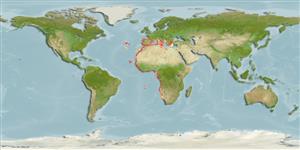Teleostei (teleosts) >
Acropomatiformes (Oceanic basses) >
Epigonidae (Deepwater cardinalfishes)
Etymology: Epigonus: Greek, epi = over, in front + Greek, gonio = angle (Ref. 45335).
Eponymy: Constanza Giglioli née Casella (1849–1940) was a writer of educational books. [...] (Ref. 128868), visit book page.
Environment: milieu / climate zone / depth range / distribution range
Ecology
Marine; bathydemersal; depth range 160 - 742 m (Ref. 56504), usually 200 - 400 m (Ref. 7321). Deep-water; 46°N - 29°S, 38°W - 37°E
Eastern Atlantic: western Mediterranean to the African coast except between 11°N and 6°S.
Size / Weight / Age
Maturity: Lm ? range ? - ? cm
Max length : 19.7 cm SL male/unsexed; (Ref. 44983)
Dorsal spines (total): 7; Dorsal soft rays (total): 9; Anal spines: 2; Anal soft rays: 8 - 9. Gill rakers on first arch have the common styloid shape. Teeth are developed on the center and edges of the tongue (Ref. 31632). Snout tapering to a rounded point; eye very large, longer than high. Opercular spine pungent, bony, surmounted by one or more poorly ossified spinelets. Mouth large, lower jaw equal to or projecting slightly beyond upper jaw. Pyloric caeca 6-8. Preserved specimens are yellow-brown in color; dorsal fin membrane dark.
Occurs chiefly on the upper portion of the continental slope. Depth range from 200-600 m (Ref. 07321, 74332) and from 351-742 m in the eastern Ionian Sea (Ref. 56504, 74332). A mesobenthic-pelagic species living mainly above the bottom (Ref. 31632). Adults are strongly associated with the substrate (Ref. 4738).
Life cycle and mating behavior
Maturity | Reproduction | Spawning | Eggs | Fecundity | Larvae
Maugé, L.A. and G.F. Mayer, 1990. Apogonidae. p. 714-718. In J.C. Quero, J.C. Hureau, C. Karrer, A. Post and L. Saldanha (eds.) Check-list of the fishes of the eastern tropical Atlantic (CLOFETA). JNICT, Lisbon; SEI, Paris; and UNESCO, Paris. Vol. 2. (Ref. 7321)
IUCN Red List Status (Ref. 130435: Version 2024-1)
Threat to humans
Harmless
Human uses
Tools
Special reports
Download XML
Internet sources
Estimates based on models
Preferred temperature (Ref.
123201): 8.8 - 14.6, mean 13.3 °C (based on 105 cells).
Phylogenetic diversity index (Ref.
82804): PD
50 = 0.5000 [Uniqueness, from 0.5 = low to 2.0 = high].
Bayesian length-weight: a=0.00933 (0.00533 - 0.01633), b=3.09 (2.93 - 3.25), in cm total length, based on LWR estimates for this species & Genus-body shape (Ref.
93245).
Trophic level (Ref.
69278): 3.5 ±0.5 se; based on size and trophs of closest relatives
Resilience (Ref.
120179): Medium, minimum population doubling time 1.4 - 4.4 years (Preliminary K or Fecundity.).
Fishing Vulnerability (Ref.
59153): Low vulnerability (14 of 100).
Nutrients (Ref.
124155): Calcium = 25.7 [5.4, 99.6] mg/100g; Iron = 0.607 [0.212, 1.455] mg/100g; Protein = 2.33 [0.00, 6.09] %; Omega3 = 0.515 [0.207, 1.339] g/100g; Selenium = 9.53 [2.77, 30.05] μg/100g; VitaminA = 27.9 [6.4, 123.8] μg/100g; Zinc = 0.473 [0.239, 0.938] mg/100g (wet weight);
